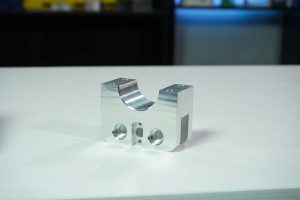When it comes to manufacturing custom machined parts, one of the most important decisions to make is the choice of material. Two of the most commonly used materials in the industry are aluminum and steel. Both have their own set of benefits and drawbacks, and choosing the right one for your application is crucial.
In this article, we’ll take a closer look at aluminum and steel and compare their properties and characteristics to help you determine which material is better for your custom machined parts.
A Brief Overview of Aluminum
Aluminum is a lightweight, silvery-white metal that is abundant in the Earth’s crust. It is the most abundant metal in the world, making up about 8% of the Earth’s crust by weight. Aluminum is also a highly versatile material, and its properties make it ideal for a wide range of applications.
Aluminum has a high strength-to-weight ratio, which makes it perfect for applications that require a strong but lightweight material. It is also highly resistant to corrosion, which makes it a popular choice for outdoor applications or in environments where the material may come into contact with moisture.
A Brief Overview of Steel
Steel, on the other hand, is an alloy made primarily from iron and carbon. It is a very strong and durable material, and it has been used for centuries in construction, manufacturing, and other applications.
Steel is a versatile material that comes in many different forms and grades, each with its own set of properties and characteristics. It can be hardened and tempered to increase its strength and durability, and it can also be alloyed with other metals to improve its properties.
Comparing Aluminum and Steel
Now that we have a basic understanding of aluminum and steel, let’s compare the two materials in terms of their properties and characteristics.
Strength
When it comes to strength, steel is generally stronger than aluminum. This is because steel has a higher density and a higher modulus of elasticity than aluminum. This means that steel can withstand more force without deforming or breaking.
However, it is important to note that aluminum has a higher strength-to-weight ratio than steel. This means that, for applications that require a strong but lightweight material, aluminum may be a better choice.
Corrosion Resistance
Aluminum is highly resistant to corrosion, thanks to a thin layer of aluminum oxide that forms on the surface of the metal when it is exposed to air. This layer acts as a protective barrier, preventing further corrosion.
Steel, on the other hand, is prone to corrosion if it is not properly protected. This is why steel is often coated with a layer of paint, galvanized, or plated with another metal to improve its corrosion resistance.
Machinability
Both aluminum and steel are relatively easy to machine, but they each have their own quirks that need to be taken into account.
Aluminum, for example, has a tendency to "gum up" cutting tools, especially if it contains a high percentage of silicon or other alloys. This can lead to poor surface finishes and tool breakage if not addressed properly.
Steel, on the other hand, can be more difficult to machine due to its hardness. Special cutting tools and techniques may be needed to achieve the desired results.
Cost
When it comes to cost, aluminum is generally more expensive than steel. This is because the production process for aluminum is more complex than that for steel, and aluminum is also a more valuable material.
However, it is important to note that the cost of the material is only one factor to consider when choosing between aluminum and steel. Other factors, such as the desired properties of the finished part and the manufacturing process, may also play a role.
Choosing the Right Material for Your Custom Machined Parts
So, which material is better for your custom machined parts? The answer, as with manyengineering decisions, depends on a variety of factors, including the specific application, the desired properties of the finished part, and the budget.
If your application requires a strong and durable material that can withstand heavy loads and impacts, steel may be the better choice. However, if your application requires a lightweight material that is highly resistant to corrosion, aluminum may be the way to go.
It’s also important to consider the manufacturing process when choosing between aluminum and steel. For example, if you need a large quantity of parts, steel may be a more cost-effective choice due to its lower cost. On the other hand, if you need a smaller quantity of parts, aluminum may be the better choice due to its higher strength-to-weight ratio.
Ultimately, the choice between aluminum and steel comes down to a careful consideration of all the factors involved. By working closely with your machinist or engineer, you can determine which material is best suited for your specific application.
Conclusion
In conclusion, both aluminum and steel have their own set of benefits and drawbacks when it comes to custom machined parts. Steel is generally stronger and more durable, while aluminum is lightweight and highly resistant to corrosion.
When choosing between the two materials, it’s important to consider the specific requirements of your application, including strength, corrosion resistance, machinability, and cost. By taking all of these factors into account, you can make an informed decision about which material is best suited for your custom machined parts.
So, whether you choose aluminum or steel, you can rest assured that you’ll end up with a high-quality finished product that meets your specific needs.



